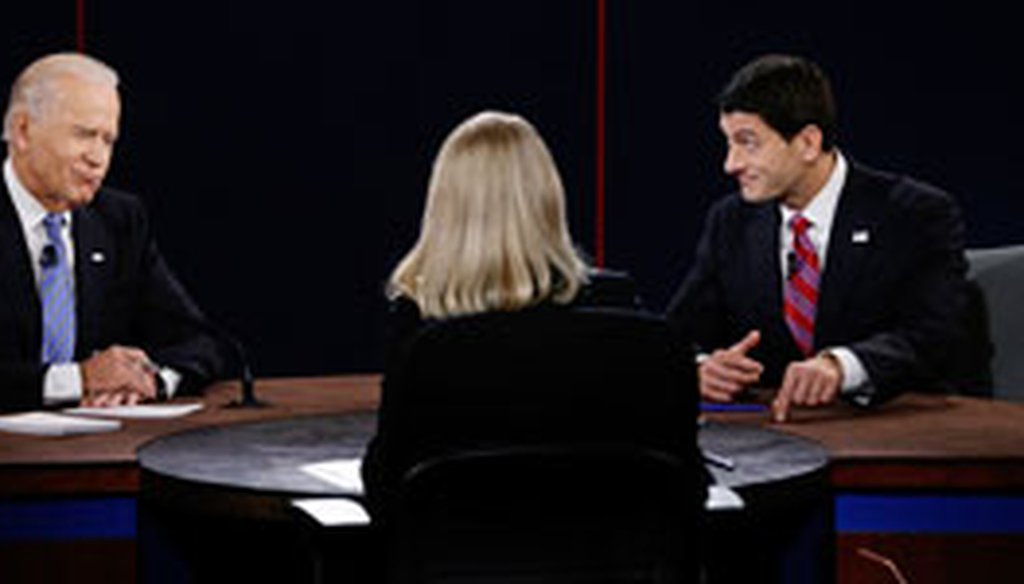Get PolitiFact in your inbox.

Vice President Joe Biden and Republican vice presidential nominee Rep. Paul Ryan of Wisconsin, debate Oct. 11, 2012, in Danville, Ky. (AP)
Updated Friday, October 12th, 2012 at 5:53 p.m.
The vice presidential debate Thursday night began on a somber note, then quickly turned to lively attacks — with both candidates stretching the truth.
Moderator Martha Raddatz asked Vice President Joe Biden whether the assault that recently killed a U.S. ambassador in Libya represented a massive intelligence failure.
Biden said it was a tragedy. Then he went after Rep. Paul Ryan's partner on the Republican presidential ticket, Gov. Mitt Romney. And the wrangling began, some of it truthful, much of it just partly so.
Foreign policy
Biden attacked Romney's past statements on foreign policy. President Barack Obama had promised to end the war in Iraq, Biden said, while "Romney said that was a tragic mistake, we should have left 30,000 troops there." It’s true that Romney characterized Obama’s 2011 deadline with the word "tragic." Romney did not say ending the war was tragic; he was talking about the speed at which Obama removed all troops. Romney’s preference was to leave a large residual force, and he has used an estimate of up to 30,000 in the past, as Biden said during the debate. We rated Biden’s claim Half True.
Biden also claimed Romney said he "wouldn't move heaven and earth to get (Osama) bin Laden." We've rated a similar claim from an Obama ad, that Romney's view on killing bin Laden was "it's not worth moving heaven and earth." The Obama team was right that Romney used those words, but it's cherry-picking, glossing over comments describing his broader approach. Romney said he wanted to pursue all of al-Qaida, not just its leaders. We rated the claim Half True.
Biden said that Obama would end the war in Afghanistan in 2014, but claimed that Romney said the United States shouldn't set a date, and with regard to 2014, "it depends." Ryan responded that Romney and Ryan agree with a 2014 deadline for U.S. withdrawal. There's some evidence for all of those claims. We checked a statement by Ryan in September that he and Romney have "always agreed" with the 2014 timetable. We found numerous instances where Romney expressed support for that deadline. His criticism was not of the date itself but the announcement of it, which he said emboldened the Taliban and endangered troops. But Romney also has said a troop withdrawal would be conditional on what the situation on the ground is -- an important caveat that could leave him room to ignore the deadline. (Or, as Biden said, "it depends.") Ryan’s previous statement was accurate but for that one detail. We rated it Mostly True.
Biden, pressed on the administration's response to the attack in Libya, said, "We weren't told they wanted more security " for diplomatic facilities. That statement is accurate only if you define "we" to mean "people at the White House." A State Department officer in Libya said that he requested additional guards and was turned down by at least one other official in the State Department. The White House said Biden meant that the security requests had not been conveyed to him and others in the executive office. It's possible that Biden and Obama were unaware of that request. Still, it was made in the State Department, which is part of the Obama administration. Even if it didn't make its way up through the bureaucracy, a request was made. We rate the statement Mostly False.
On Iran, Ryan described the impression he thought the ayatollahs would get about the U.S. relationship with ally Israel. Ryan claimed Obama was in New York City the same day as Israeli Prime Minister Benjamin Netanyahu but went on a TV show instead of meeting with him. The two leaders were not there on the same day: Obama was there Monday and Tuesday, and Netanyahu was there later in the week, on Thursday and Friday. Obama taped The View on Monday. We rated this claim False.
Three times during the debate, Ryan accused the Obama administration of being soft on Syrian president Bashar al-Assad. The administration, Ryan said, "called Bashar Assad a reformer when he was turning his Russian-provided guns on his own people." The comment Ryan referenced came just over a week after killings of protesters by government forces in Deraa, on the March 27, 2012, edition of CBS’ Face the Nation, which included an appearance by Secretary of State Hillary Clinton. She said, "Many of the members of Congress of both parties who have gone to Syria in recent months have said they believe he’s a reformer." Clinton was describing what she understood lawmakers’ views to be. Still, as a secretary of state speaking on national television, her decision to discuss such beliefs without knocking them down suggests that she lent them at least some credibility. We rated Ryan’s claim Half True.
Ryan also said Biden"went to China and said that he sympathized and wouldn't second-guess their one child policy of forced abortions and sterilizations." Biden did not use the word "sympathize" and didn’t endorse the one-child policy. Instead, he said that he understood it and wouldn’t second-guess it. Days after the speech, his spokeswoman said he specifically condemned "coercive birth limitation policies." Ryan’s claim contains a kernel of truth, but it ignores critical context that would leave a different impression. We rated this Mostly False.
Auto industry, home foreclosures, taxes and the stimulus
Biden claimed that Romney wasn't committed to saving the auto industry. "He said, let it go bankrupt, period," Biden said. We checked a similar claim from Jennifer Granholm, former governor of Michigan, at the Democratic National Convention in September. She said that Romney's response to the crisis in the auto industry was, "Let Detroit go bankrupt." Romney did use the words about letting Detroit go bankrupt in a CBS TV interview, but his meaning was more nuanced and he emphasized that he was not referring to liquidation. We rated Granholm's statement Half True.
Biden also claimed the Obama administration helped people refinanced their homes, while Romney said, "No, let foreclosures hit the bottom." A Democratic National Committee ad in 2011 said that Romney’s housing policy was, "Don’t try and stop the foreclosure process. Let it run its course and hit the bottom." That was part of his policy, but Democrats edited out his remarks that said the housing market should then turn around and come back up as investors buy properties and rent them out. Romney also said he was open to ideas for encouraging refinancing. Romney did seem to favor letting foreclosures run their course, but he also suggested that doing so would enable investors to buy low-priced homes and revive the market. We rated the DNC’s ad Half True.
In an exchange about the effectiveness of Obama's stimulus, Ryan asked Biden whether it was "a good idea to spend taxpayer dollars on electric cars in Finland, or on windmills in China?" An American car company, Fisker Automotive, got federal loan guarantees and later manufactured cars in Finland, but the federal support the company received wasn't funded by the stimulus. Meanwhile, the loans went toward engineering and design that happened in the United States. As for the windmills in China, it's true that a small number of windmills and components to build them came from China. But the statement greatly exaggerates China’s role in the overall use of stimulus money. We rated Ryan's statement Mostly False.
Ryan said the Obama administration passed the stimulus with the idea that "unemployment would never get to 8 percent." Obama's Council of Economic Advisers created a chart predicting that the stimulus would keep the unemployment rate from going higher, but the accompanying report included heavy disclaimers that the projections had "significant margins of error" and a high degree of uncertainty due to a recession that is "unusual both in its fundamental causes and its severity." We rated Ryan's statement Mostly False.
Ryan also sought to contrast Obama's policies with Canada's, saying, "The Canadians — they (dropped) their tax rates to 15 percent. The average tax rate on businesses in the industrialized world is 25 percent." He’s correct on both counts, though it’s worth pointing out that provincial taxes boost Canada’s rate to 26.1 percent, and that the actual rate paid by specific companies in certain countries, such as the United States, can be lower than official rates due to deductions and exemptions. We rated his claim Mostly True.
Health care
Ryan claimed that Obama took money from Medicare to spend on Obamacare. Romney has said something similar, that "under the president's plan, he cuts Medicare by $716 billion, takes that money out of the Medicare trust fund and uses it to pay for Obamacare." The claim gives the impression that the law takes money that was already allocated to Medicare and funds the new health care law with it. In fact, the law uses a number of measures to try to reduce the rapid growth of future Medicare spending. Those savings are then used to offset costs created by the law -- especially coverage for the uninsured -- so that the overall law doesn't add to the deficit. We rated the statement Half True.
Biden said about Ryan and Romney's plan for Medicare, "It's a voucher." Obama made a similar claim in the presidential debate, that Romney "would turn Medicare into a voucher program." The plan would give seniors a premium support payment toward private insurance, to replace the current system of government payments to doctors and hospitals. Generally, we think "voucher program" is a fair way of describing to voters the vision for Medicare under a Romney-Ryan administration. We rated Obama's claim Mostly True.
Biden also said Romney and Ryan would "eliminate the guarantee of Medicare." Here's the deal: Calling today’s Medicare benefits "guaranteed" is partially, but not entirely, true. Currently, Medicare does guarantee broad health coverage for seniors and, in the short term, guarantees specific benefits. But Medicare doesn’t cover everything, and Congress and the president can change what is covered -- and will be forced to do so as fiscal pressures hit. Meanwhile, it’s plausible that the Romney plan could provide less of a "guarantee" than Medicare currently does, but we found sharp disagreement between supporters and opponents of Romney’s Medicare plan on that point. This disagreement is hard to resolve given the shortage of information Romney has so far provided. We rated Biden's claim Half True.
Ryan said his Medicare plan had bipartisan support. Biden responded: "There's not one Democrat who endorses it." That hasn’t always been the case. Last year, Sen. Ron Wyden, D-Ore., and Ryan put their heads together and offered a compromise proposal for the future of Medicare. But that bipartisan bond began to crack months ago when the Wisconsin congressman put forth a second budget with provisions Wyden opposed. Their partnership dissolved in August, after Ryan joined the Romney ticket, and Wyden made a point of talking up the differences between his and the Republicans’ ideas for Medicare, not the similarities. Wyden was the only Democrat to endorse Ryan’s idea of premium support in Medicare, and his approval has clearly been revoked. We rated Biden’s statement True.
Ryan, in his closing statement, said Obama "made his choices," including "a government takeover of health care." The phrase is simply not true. "Government takeover" conjures a European approach where the government owns the hospitals and the doctors are public employees. But Obama's health care law relies largely on the free market. We voted "a government takeover of health care" our Lie of the Year for 2010.
Did you hear a claim you would like us to check? Use Twitter hashtag #PolitiFactThis or email us at [email protected].
Our Sources
See individual fact-checks for complete sources.


















































